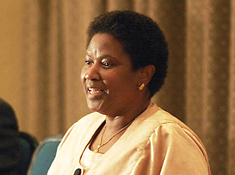SA's 'dramatic shift' on Aids
30 October 2006
The South African government has made a "dramatic shift" in its approach to HIV/Aids, the Washington Post reported on Friday, with treatment and prevention getting new emphasis as Deputy President Phumzile Mlambo-Ngcuka takes a lead role in the fight against the epidemic in the country.
In his front page article - headlined "In South Africa, a dramatic shift on Aids" - Washington Post foreign correspondent Craig Timber writes that the SA government is "seeking to shake off years of international denunciation for its handling of the Aids epidemic - including a fixation on the supposed protective powers of beets and lemons - while expanding treatment, testing and prevention programs.
"In public comments and private meetings over the past six weeks, Deputy President Phumzile Mlambo-Ngcuka has emphasized that the government now believes unequivocally that HIV causes Aids, a connection that President Thabo Mbeki once publicly questioned," Timber writes.
"She has also said that antiretroviral drugs must be the centerpiece of the government's response while playing down the dietary recommendations long cited by Health Minister Manto Tshabalala-Msimang as key to fighting Aids."
"The beetroot and all that lemon stuff is out the window," Timber quotes an unnamed adviser involved in recasting the government's policy as saying. "These guys are now serious about getting it right."
According to the report, the SA government is now working cooperatively with members of local Aids activist group the Treatment Action Campaign (TAC) to "realize some of their long-standing demands, such as setting targets for dramatically expanding the availability of antiretroviral drugs through the public health system."
"There's clearly a shift taking place," Timber quotes TAC head Zackie Achmat as saying.
Following the public relations disaster of South Africa's display at the International Aids Conference in Toronto in August - for which SA Health Minister Manto Tshabalala-Msimang was heavily criticised internationally - Mlambo-Ngcuka has taken up a central role in the government's programme to combat HIV/Aids.
Early in September, the Deputy President announced measures to beef up the SA National Aids Council (Sanac), which she chairs, and mend relations with non-governmental organisations working in the field.
She also took on the role of spokesperson for a new inter-ministerial committee set up by the government to monitor and strengthen the implementation of the state's HIV/Aids programme.
Speaking after the committee's first meeting, Mlambo-Ngcuka said the ministers and others present had discussed a number of ways in which Sanac, the government's lead agency in the fight against HIV/Aids, could be strengthened.
She also said the meeting had "underscored the need to take concrete steps to mend relations and raise the level of interaction between government and stakeholder groupings" such as the TAC and the National Association of People Living with HIV/Aids.
According to the Washington Post report, South African Aids activists initially reacted warily to the government's overtures, "but after meeting privately with Mlambo-Ngcuka, including a session [last] Tuesday in Cape Town that lasted nearly two hours, they have grown more confident of the government's desire to improve its handling of the disease."
"I'm still skeptical, and I'm still waiting for the proof," Francois Venter, head of the Southern African HIV Clinicians Society, told Timber. "But there's been a switch, the most hopeful switch in years, over the past four or five weeks."
Government spokesman Themba Maseko told Timber that officials had decided to set firm targets for expanding prevention programmes and making antiretroviral drugs available in a five-year plan due for release on World Aids Day on 1 December.
"We will be accelerating implementation to make sure those who need treatment are getting it," the Washington Post quoted Maseko as saying.
SouthAfrica.info reporter
|














